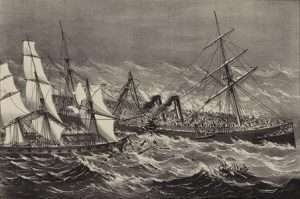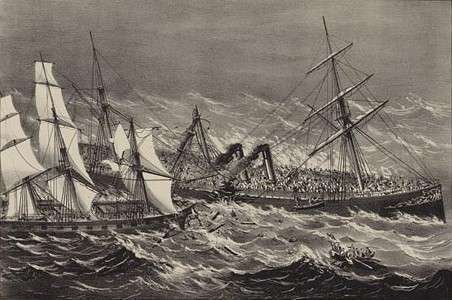 The year was 1873. Horatio G. Spafford (1828-1888) suffered the tragic loss of all four of his young daughters on the same day. That loss prompted him to write a poem that later became a song that, to this day, continues to be one of the best-loved Christian hymns. Before we learn how he lost his daughters, we need to back up and take a quick snapshot of Horatio Spafford’s life.
The year was 1873. Horatio G. Spafford (1828-1888) suffered the tragic loss of all four of his young daughters on the same day. That loss prompted him to write a poem that later became a song that, to this day, continues to be one of the best-loved Christian hymns. Before we learn how he lost his daughters, we need to back up and take a quick snapshot of Horatio Spafford’s life.
Mr. Spafford was a lawyer and a very devoted Christian (yes, it is possible to be both!). He established a successful law firm and his business made him very wealthy. He married a lovely wife, Anna, and they had five children.
In 1871 their 2-year-old son died of scarlet fever.
In October of 1871, the Great Chicago Fire destroyed thousands of buildings and killed about 300 people. Because Horatio Spafford had invested a lot of his wealth in real estate along the water’s edge of Lake Michigan, that fire consumed most of his wealth, including his law firm. For the next two years, he worked hard to replace at least some of what he had lost. Then the recession of 1873 further hurt his business.
In November of 1873, he planned to take his family on a much-needed vacation. His wife and four children—11-year-old Anna, 9-year-old Maggie Lee, 5-year-old Elizabeth and 2-year-old Tanetta—boarded a French ocean liner bound for Europe. At the last-minute, Mr. Spafford had to stay behind to tend to some unexpected business, but he planned to follow them on the next ship.
Four days into the Spafford’s trip, their ship collided with an iron-hulled Scottish ship. In about 12 minutes their ship slipped into the dark, icy waters of the Atlantic Ocean. A sailor in a lifeboat spotted Mrs. Spafford clinging to a piece of wreckage. She survived, but 226 passengers did not, including her four children. The survivors were soon rescued by another ship, and nine days later they arrived in Cardiff, Wales.
As soon as she could, Anna Spafford wired a message to her husband that began with these words, “Saved alone, what shall I do?” Another of the ship’s survivors later recalled Anna saying, “God gave me four daughters. Now they have been taken from me. Someday I will understand why.”
Mr. Spafford boarded the next available ship to be with his distraught wife. When that ship was about four days out to sea, the Captain told him that they were close to the place where his four little girls lost their lives. As he reflected on his loss, he later wrote these words:
When peace like a river attendeth my way,
When sorrows like sea billows roll,
Whatever my lot, Thou hast taught me to say,
It is well; it is well with my soul.
In the years that followed, the Spaffords had three more children, but in 1875 one of them, a four-year-old boy, died of pneumonia.
It is hard for us to imagine how we might react to such great suffering, much like when we read in the Bible about Job’s agony. Yet Job himself was able to say, “Though He slay me, I will hope in Him.….” (Job 13:15).
That kind of commitment to God is ONLY possible if we possess something that is supremely and eternally more valuable than any loss we might suffer.
Here is another example. Another man who also endured much suffering was the Apostle Paul. In fact, notice a sample of what he suffered: “… imprisonments, beaten times without number, often in danger of death. Five times I received from the Jews thirty-nine lashes. Three times I was beaten with rods, once I was stoned, three times I was shipwrecked, a night and a day I have spent in the deep. I have been on frequent journeys, in dangers from rivers, dangers from robbers, dangers from my countrymen, dangers from the Gentiles, dangers in the city, dangers in the wilderness, dangers on the sea, dangers among false brethren; I have been in labor and hardship, through many sleepless nights, in hunger and thirst, often without food, in cold and exposure” (2 Corinthians 11:23–27).
Wow! Compared to that, we don’t really have anything to complain about, do we?
When Paul thought about his many tribulations, he said, “I count all things to be loss in view of the surpassing value of knowing Christ Jesus my Lord, for whom I have suffered the loss of all things, and count them but rubbish so that I may gain Christ, and may be found in Him, not having a righteousness of my own derived from the Law, but that which is through faith in Christ, the righteousness which comes from God on the basis of faith” (Philippians 3:8–9).
When a person falls in love with Jesus Christ–because He paid the awful penalty for all their sins on the Cross–then His unending love for them will always be the most supremely and eternally valuable possession.
“Who will separate us from the love of Christ? Will tribulation, or distress, or persecution, or famine, or nakedness, or peril, or sword?… But in all these things we overwhelmingly conquer through Him who loved us. For I am convinced that neither death, nor life, nor angels, nor principalities, nor things present, nor things to come, nor powers, nor height, nor depth, nor any other created thing, will be able to separate us from the love of God, which is in Christ Jesus our Lord” (Romans 8:35, 37–39).
Horatio Spafford knew that love. That is why he could write these words, the last two verses of his song “It Is Well With My Soul:
Though Satan should buffet, though trials should come,
Let this blest assurance control,
That Christ has regarded my helpless estate,
And hath shed His own blood for my soul.
My sin, oh, the bliss of this glorious thought!
My sin, not in part but the whole,
Is nailed to the cross, and I bear it no more,
Praise the Lord, praise the Lord, O my soul!

